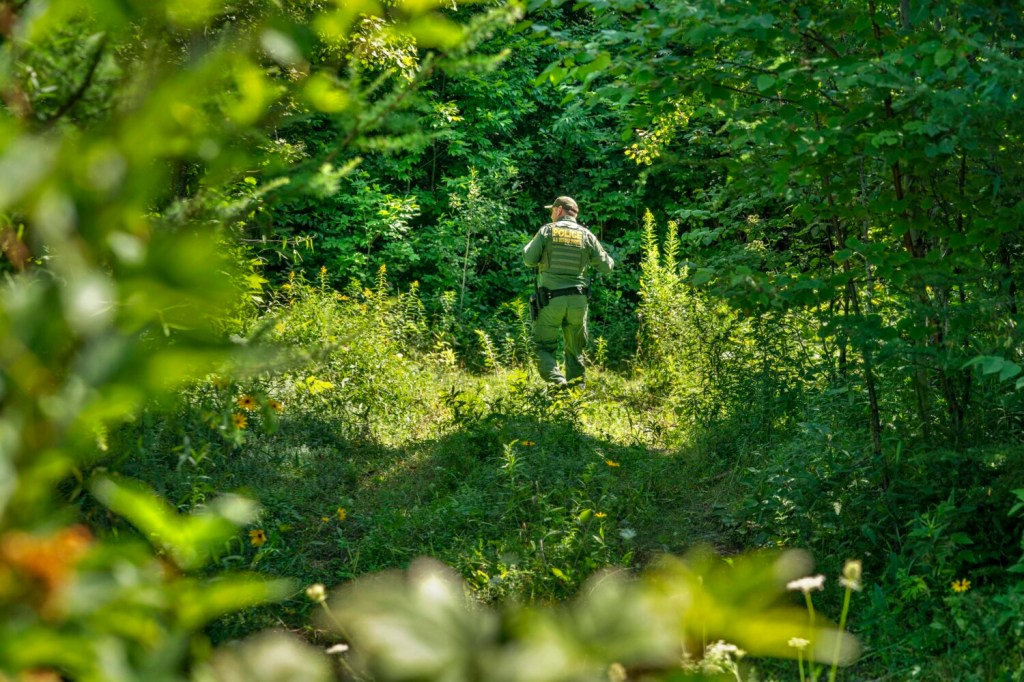
A Border Patrol agent walks through the woods along the U.S. border with Canada in Houlton in 2019. (Gregory Rec/Staff Photographer)
As the Trump administration ramps up deportation efforts, U.S. Customs and Border Protection agents are showing up at traffic stops and work sites in Maine towns from Fort Fairfield to Old Orchard Beach and arresting people much farther away from their traditional posts.
Border Patrol has long been allowed deep into the interiors of Maine because the entire state falls within its 100-mile border zone. Yet some critics fear the agency is going too far beyond its work at the literal border, and they’re concerned by reports that agents are surveilling job sites with drones and collaborating with local police.
While data shows actual border arrests by the agency are down nationwide, Border Patrol has been working deeper inside the country — much like U.S. Immigration and Customs Enforcement, or ICE.
Border Patrol agents “are being deployed essentially to areas beyond what is normally part of their authority and their mission, I would say,” said Deborah Anthony, a law professor at the University of Illinois in Springfield who monitors the agency nationally. “And their approach to dealing with people, sometimes it’s problematic and there’s some reports of mistreatment of people who they’re interacting with.”
Some who were arrested have been in the U.S. for years, including people who have been removed from the country before and those with pending asylum claims or those with permission to work. Many have ended up in ICE custody, being transferred to prisons hundreds of miles away.
Craig Shepley, the acting chief of CBP’s Houlton sector, which oversees Border Patrol operations in Maine, was not available for an interview this summer.
In response to a list of questions about their operations, Acting Deputy Chief Patrol Agent Dylan Brandt said in an emailed statement Friday that the agency’s “mission remains unchanged: to protect America and its citizens by securing the nation’s borders and intercepting or deterring all attempts at illegal entry.”
He said that because of Border Patrol’s “targeted enforcement operations … apprehensions this year are on track to surpass all historical records in Maine.” That includes people who illegally crossed the southwest border, he said.
Border Patrol has increasingly made more of what it calls “at large” arrests along the northern border of the U.S., focused on immigrants who came to the country legally but stayed longer than they were allowed or who entered illegally and made it to where they were going.
The agency had made 439 at-large arrests along the northern border in July, according to CBP data, up from 166 around the same time last year. Brandt said that data includes arrests in Maine, but did not provide requested Maine-specific apprehension data.
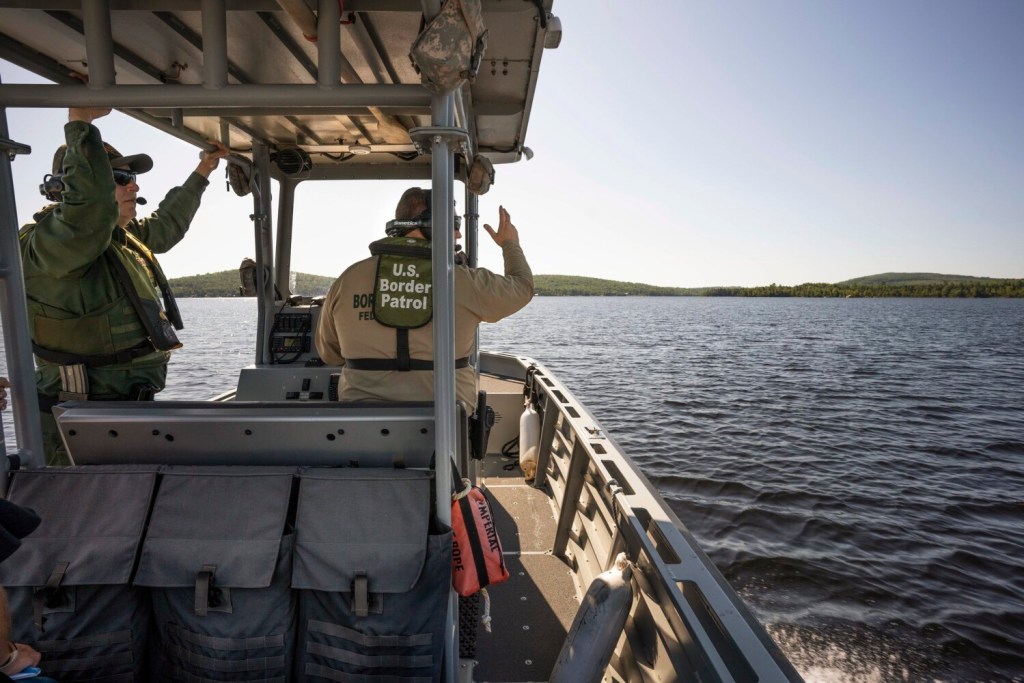
A Border Patrol agent in 2019 waves to people fishing in North Lake near the town of Orient, while patrolling the U.S. and Canadian border, which runs through the lake. (Gregory Rec/Staff Photographer)
That can partly be attributed to some local law enforcement agencies calling in Border Patrol to help identify people they stop if an officer suspects they are in the country illegally.
Immigrant rights advocates in Maine say they’re concerned about that collaboration and the broad authority federal agents have to make immigration arrests.
One Massachusetts immigration attorney said in early July that she has advised some clients to avoid coming to Maine for work, even if their employment authorization forms are in order, because of Border Patrol’s broad reach in the state.
“Border Patrol can do anything,” attorney Kira Gagarin said at the time. “That’s the thing.”
TRAFFIC STOPS AS A TOOL
The Trump administration has set high goals for deportations, arresting tens of thousands of people each month. Their strategy includes investing billions of new dollars into the Department of Homeland Security and a campaign to review more than 55 million U.S. visa-holders for potential violations.
More than 31,000 people nationally were arrested by immigration officials in July, according to Syracuse University’s Transactional Records Access Clearinghouse, a nonpartisan organization tracking immigration data. More than 12% of those arrests were made by U.S. Customs and Border Protection, according to the university group.
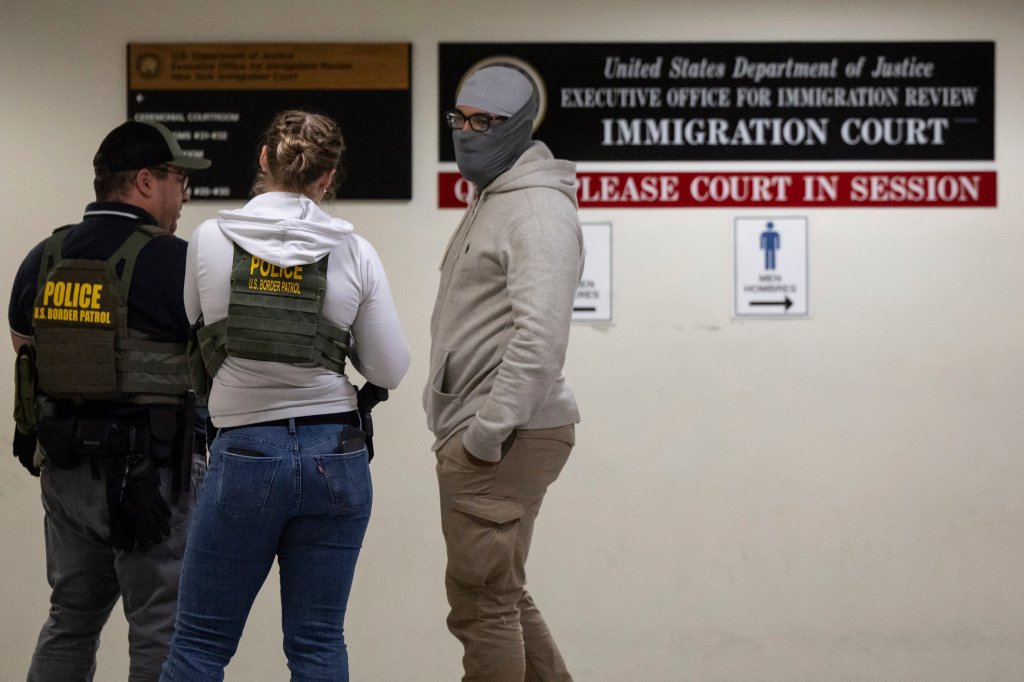
Border Patrol agents wait outside an immigration courtroom in June at the Jacob K. Javits Federal Building in New York. (Yuki Iwamura/Associated Press)
Local traffic stops, Anthony said, have been an especially helpful tool nationally for Border Patrol in situations where the agency can’t pull someone over for a traffic violation and they can only act on suspected immigration violations.
Experts and advocates say local stops are being increasingly used for immigration enforcement, even if indirectly.
The Portland Press Herald/Maine Sunday Telegram reviewed about two dozen stops across Maine from January to August that involved Border Patrol, most ending in arrests. In many of those cases, the stops started with a minor infraction — a broken taillight, a passenger without a seat belt, an unlit license plate frame — and Border Patrol was eventually called by local police who suspected immigration issues.
In some cases, Border Patrol initiated its own stops. One man, a carpenter who came to the U.S. in 2024 fleeing violence in Ecuador, was driving to a job site in Maine in late July when he was stopped by agents. Records show he told them he already had an immigration court hearing scheduled the next month, but agents took him anyway.
The man, who lived in Massachusetts and had been in Maine for work, spent 17 days in Border Patrol custody before he was allowed to contact an attorney, according to court records and his lawyers.
Court records show the man was flown along with nine others from Fort Fairfield to a correctional facility in Texas on Aug. 15.
The Immigrant Legal Advocacy Project of Maine said in June they were “gravely concerned about the rights and safety of Maine residents being handed over to immigration officers” at traffic stops.
“While Maine’s state and local resources should not be wasted to investigate immigration status in any case, many of those impacted were known to be in a lawful immigration process, have a valid work permit, and no criminal record,” Executive Director Sue Roche said in a statement.
In the stops reviewed by the Press Herald, Border Patrol was often called in by local law enforcement after drivers or passengers couldn’t provide a U.S. driver’s license or if they were unable to speak English. While most were for minor reasons, some were for speeding or more serious violations, including alleged drunken driving.
Anthony Cangelosi, an adjunct lecturer at John Jay College of Criminal Justice in New York who spent more than 25 years in federal law enforcement, said it makes sense for local police to call Border Patrol for help with verifying someone’s identification.
“How do you know that I’m not wanted for some crime at that point, if I don’t have the legal or valid identification on me?” he said. “So the police can go further under that context.”
Several traffic stops by the Maine State Police, which patrols the interstate system, have resulted in Border Patrol arrests.
The Press Herald obtained documents via a public records request detailing some incidents involving the agency, including a case from February when a trooper called Border Patrol after stopping a man driving his 17-year-old nephew from Lewiston to a job site. The trooper pulled them over because they wouldn’t move out of the passing lane.
In another case from May, a state trooper called Border Patrol after pulling over two men from Brazil on their way to a work site in Maine because the trooper said he had a hard time seeing their plate, which wasn’t lit and was off center. The men were arrested and eventually transferred to ICE custody.
And, this summer, Border Patrol was called after the state police arrested a Mexican man they believed was driving under the influence. He was charged in federal court with illegally reentering the U.S. after being removed before.
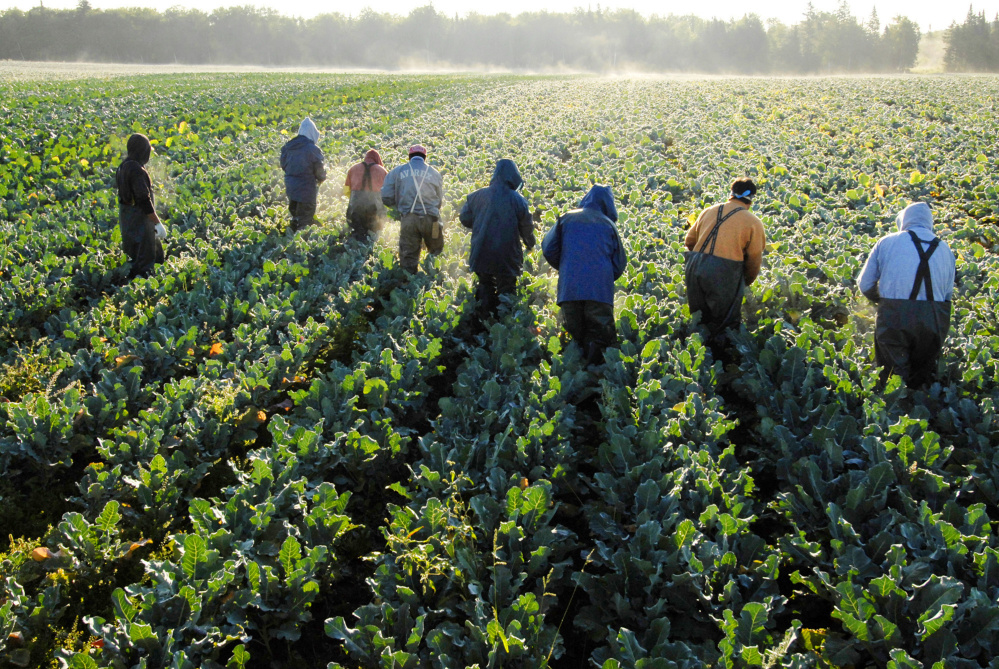
Farmworkers, mostly from Mexico and El Salvador, cut broccoli stalks at Smith’s Farm in 2006 near Fort Fairfield in Aroostook County. (John Ewing/Staff Photographer)
HOW POLICE WORK WITH BORDER PATROL
In February, the Wiscasset police chief stopped a man driving with too much snow on top of his car. The man’s three passengers were only able to provide Guatemalan identification, according to a police report, so the chief, Lawrence Hesseltine, called Border Patrol. Agents arrested at least one man who was later found guilty in federal court of being in the country illegally after previously having been removed.
Hesseltine began advising his officers that month to call Border Patrol any. time they suspect someone is in the U.S. illegally. In an email to staff released through a public records request, the chief wrote that “multiple states are issuing driver’s licenses to undocumented individuals and if you only run the license it’s not going to give you the info you are looking for.”
In Fort Fairfield, Chief Matthew Cummings said in a phone interview last month that Border Patrol agents have been a fixture of the community in the small border town for decades. He said the small department has a “close-knit” relationship with the agency, which routinely assists with incidents that require more help.
Brandt said the Houlton sector prioritizes and financially supports these collaborations through the Operation Stonegarden grant program. An annual report from the Department of Homeland Security shows that program awarded law enforcement agents in Maine more than $1 million in fiscal 2024.
Further south in Cumberland County, neither the sheriff’s office nor the Portland Police Department say they have much direct involvement with immigration officials at traffic stops.
Cumberland County Sheriff Kevin Joyce said in a phone interview last month that deputies are not instructed to contact Border Patrol. He said if deputies come across someone who may have violated immigration laws, they will not detain that person while waiting for federal agents to show up.
That would be a waste of resources, he said.
“To call Border Patrol and wait hours on somebody that was speeding, just because they may look like they’re illegal or may not have any documentation or may not speak English, it’s an impossibility for us to do that,” Joyce said. “So, we’re not going to do it.”
DRONES, FACIAL RECOGNITION
The Department of Homeland Security, Border Patrol’s parent agency, is set to receive $165 billion for immigration enforcement under the Big Beautiful Bill Act that was signed in July, including $4 billion to hire 3,000 more Border Patrol agents. It’s unclear how many could end up in Maine.
Border Patrol operates out of six stations in Maine, and staffing levels at each one change based on their need, according to Brandt, the acting deputy chief patrol agent. The agency sector did not provide the total number of employees statewide, but said it anticipates an increase in staffing this year because of new recruiting efforts.
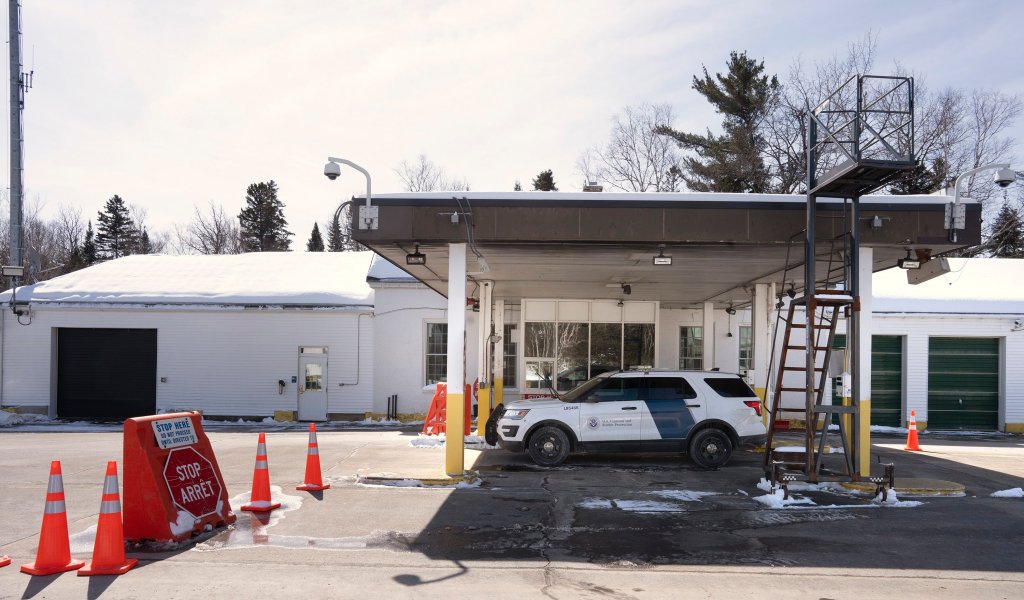
The U.S. Customs and Border Protection station in Coburn Gore in March 2024. (Gregory Rec/Staff Photographer)
CBP has begun hiring people who can start at the northern border right away, marking “a change from past practices, where new hires were required to start on the southwest border before applying for transfers to northern border locations,” Brandt said.
Advocates have said they are already troubled by Border Patrol’s increased activities, especially its surveillance.
In at least one incident from June, Border Patrol used drones to watch people while they were working. After an agent reported passing a van belonging to a Maine roofing company, which they suspected employed workers who are in the U.S. illegally, agents used a drone to find and watch the job site.
“I departed the area to not frighten the crew and utilized a Parrot UKR small unmanned aerial unit to watch the vehicles and males from approximately 1,000 feet away,” the agent wrote in a report provided by an immigration attorney.
Agents waited until about 7 p.m., after the roof was complete, and then pulled the van over once they were leaving the job site. The men were arrested, according to the Border Patrol agent, after he said they “readily admitted to being in the United States illegally and working without permission.”
Brandt said drones are a “critical tool” in their work and that they’ve recently expanded their usage, increasing the number at their stations and training more people to use them.
Anthony, the law professor who monitors Border Patrol, said activities like these are “pretty new” for the agency.
“That has not been the norm for Border Patrol, and there are a lot of privacy and Fourth Amendment concerns about this broad sort of surveillance, or watching people, to try to come up with evidence of an immigration violation,” she said. “The implications are pretty broad and sweeping, not just for immigrants, but for everybody.”
Editor’s note: This story was updated on Aug. 25 to clarify Border Patrol’s ability to conduct traffic stops.

